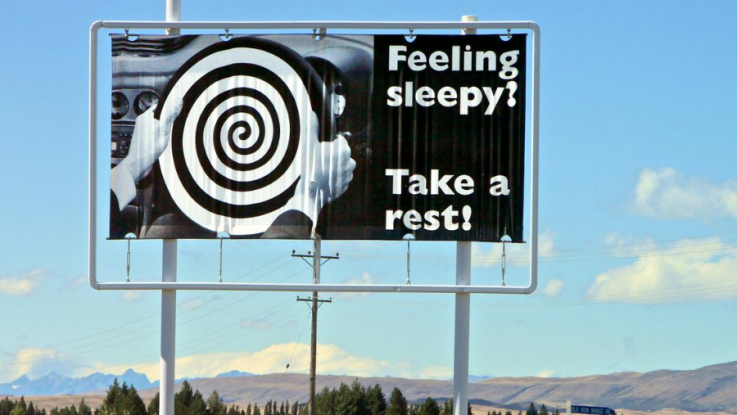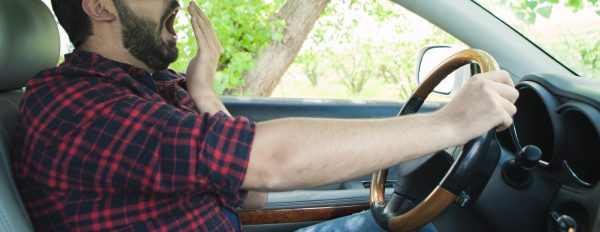
Lack of sleep, and restless sleep, have been studied for decades and are considered by the Centers for Disease Control and Prevention (CDC) to be a major health and public safety issue. The CDC recommends that all adults get at least seven hours of quality sleep each night. More than one-third of Americans do not achieve that goal.
Poor sleep not only makes you feel groggy, it also can have lasting effects on health. Poor sleep increases risk factors for diabetes, high blood pressure, obesity, and depression. It also contributes to overall poor quality of life.
Of particular importance to RVers and other motorists, the National Highway Traffic Safety Administration estimates that 72,000 accidents a year involve drowsy driving. Driving after a restless or poor night of sleep can be the same as having a blood alcohol concentration of 0.10 percent. The legal limit in most states is 0.08 percent. Anything affecting our reaction time or ability to make quick decisions, particularly in an RV, can lead to dangerous, even deadly, consequences.
RVers are faced with unique challenges when it comes to getting restful sleep. These include continually changing environments; difficulty in climate control; and long, stressful days driving large rigs. Here, then, are 10 tips to ensure you catch a few more zzzzs on the road.

1. Get comfortable.
RVs generally are not delivered with the most comfortable mattresses. A comfy mattress will help produce provide a more restful night of sleep and help reduce pain and stiffness. Many solutions are available, including feather-topped mattress pads, memory-foam toppers, and residential-sized mattresses. You also could consider a custom RV mattress.
2. Stay awhile.
An interesting phenomenon unique to travelers is called “first night effect.” When staying in a new place, the first night’s rest typically is not as deep or restful. That’s because part of the brain remains on high alert throughout the night, so one can react more quickly to new dangers. This isn’t necessarily a bad thing, but if a full day of travel is planned the following day, it is important to be aware that you may not be fully rested. If possible, stay in one location for a couple of nights to allow your mind and body to fully relax and rest, so you are safe on the road during the day.
3. Lights out.
A bedroom free of light is important to getting a restful night of sleep. This isn’t difficult to achieve when boondocking or camping at most state and national parks; however, when you stay in a parking lot, or the friendly camp host puts you next to a streetlight at an RV park, a few preparations will help. If you are planning to redecorate your RV, consider room-darkening and blackout curtains. Another option is to use reflective foil insulation, such as that sold by Reflectix Inc.; cut pieces to size and place them over the windows with double-sided tape to block out excess light. An added bonus of this material is temperature control. In a pinch, a few blankets over the windows or a sleep mask can be quick and easy solutions.
4. Cool it off.
The best sleep comes when you are able to cover yourself with a sheet or light blanket and maintain a temperature in your sleeping area of around 60 to 67 degrees. Without electric hookups, this sometimes can be difficult. If the weather permits, open the windows to allow a cool breeze. Or, invest in a 12-volt floor fan that can be pointed toward the bed to help keep the air moving and create a cooling effect. When you are braving colder temps, fill up with propane before heading out on an RV trip, and bring along a few extra blankets to stay warm.
5. Keep it quiet.
Generators, trains, parties, wildlife, traffic — RVers literally have heard it all. But at night, you don’t want the sounds of the wild to interrupt your sleep. If you are a light sleeper, keep a pair of earplugs on the nightstand to block out the noise. “White noise” phone apps and plug-in machines also are available to help block the outside sounds. Bonus points for finding a campsite near a waterfall or busy stream from which to enjoy the white-noise machine of nature.
6. Calming scents.
Certain essential oils have a sedating and relaxing effect. One of the most popular and highly researched is lavender, which is widely available. An easy way to add essential oils to your bedtime routine is by placing a few drops on a cotton ball and putting it in a pillowcase. If you have electrical hookups, electric oil diffusers are an easy way to create a calming environment throughout the RV.
7. Add a nap.
Naps can interfere with evening rest; however, naps also can be beneficial, especially on driving days. A short nap can increase alertness and attention. Our body’s natural rhythm makes us a little sleepy after lunchtime, so don’t fight it; just follow a couple of rules to maximize benefits. If you feel the need to nap, darken your room, set an alarm for 20 minutes, and sleep no later than 3:00 p.m. to limit the nap’s impact on falling asleep in the evening.
8. Develop a routine.
A pre-sleep routine is an excellent way to tell your body it is time for bed. Make the routine your own; try it for a few weeks before you change anything or give up on it. A routine could be as simple as turning off the TV, having a cup of caffeine-free tea, and reading for 15 minutes. Others may find an evening meditation or some cuddle time with the fur babies a helpful way to calm and quiet their mind.
9. Keep it consistent.
RVers like to change things up often, but that shouldn’t include your bedtime and wake time. Keeping your bedtime consistent from day to day helps the body’s internal clock remain accurate, which makes it easier to both fall asleep at night and to wake up in the morning.
10. Skip the caffeine.
As a coffee lover myself, I would never suggest that you skip your morning java or tea. However, if you are having difficulty falling asleep, limit caffeinated beverages to the morning hours only. If you need a pick-me-up in the middle of the day, a short nap is a better option than a soda or coffee, which can have lasting effects at bedtime. A night of insomnia or restless sleep can really get us down, but we have more control over sleep than many believe.
In conclusion
Establishing beneficial sleep habits and routines are as important for a healthy mind and body as are good exercise and eating habits. Get back in the driver’s seat and take control. But first, get some sleep!
This article is meant to provide general information and is not a substitute for medical advice. If you have concerns about a sleep disorder, please consult your physician.
By Lauri Stumph, (F488907)
In 2014, Lauri and her husband, Jase, began RVing full-time with their two dogs. An occupational therapist, Lauri works in the southwestern United States each winter, taking time off in summer to hike and explore further off the beaten path.


Leave a Reply